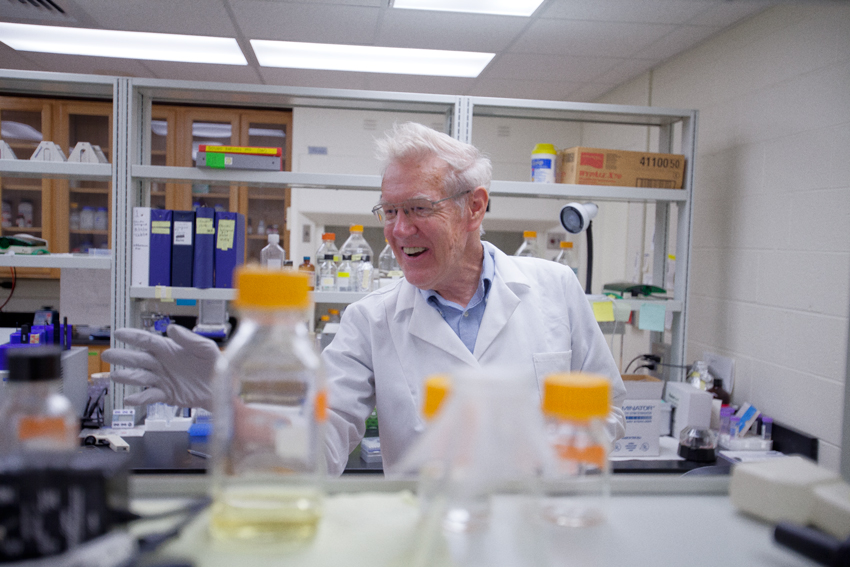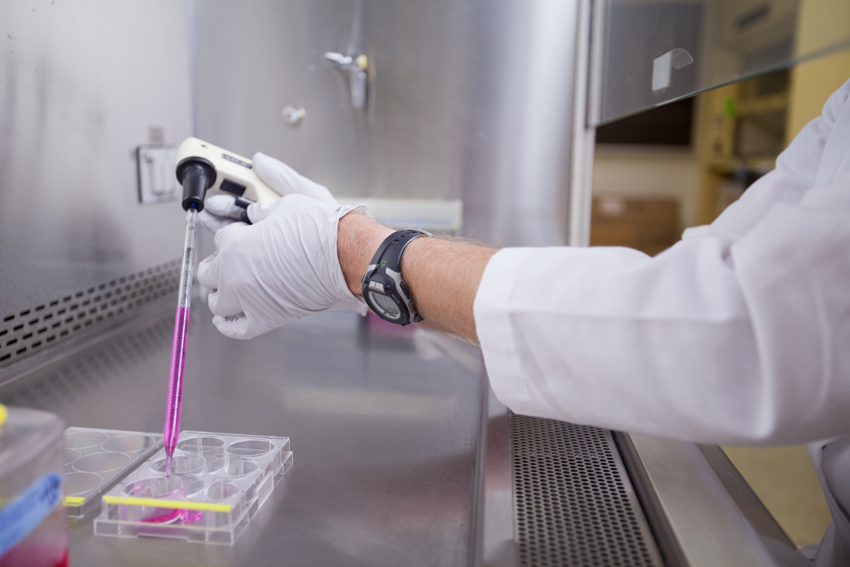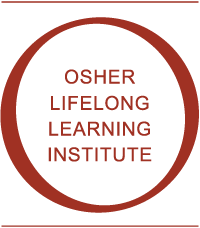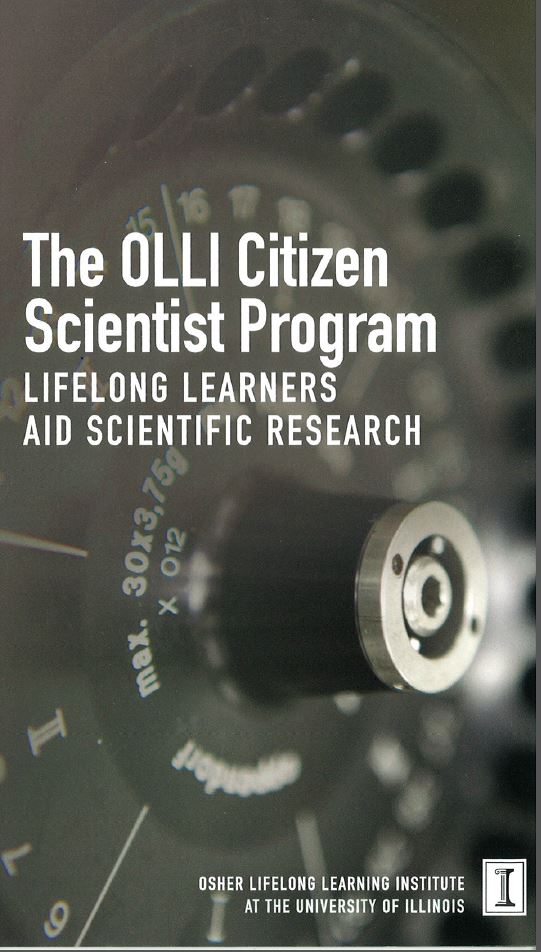Citizen Scientist Program

The OLLI Citizen Scientist Program was established in 2011, in partnership with the Beckman Institute for Advanced Science and Technology and the Carl R. Woese Institute for Genomic Biology. The program allows OLLI scholars to work as laboratory apprentices and research assistants in participating research projects on the Illinois campus.
Labs that are interested in hosting Citizen Scientist volunteers are invited to contact Danny Ryerson, Outreach Fellow at the Carl R. Woese Institute for Genomic Biology, at ryerson1@illinois.edu.
The Citizen Scientist Program is a ground-breaking collaborative endeavor that pairs OLLI members with faculty in laboratories on the Illinois campus. The central idea is that the older adult members of OLLI, who have a wealth of professional and life experience, serve as research assistants, rather than subjects, in research labs.
The experiences of both the Citizen Scientists and lab members have been mutually beneficial – with the Citizen Scientists learning how science works in practice and about the important research being conducted on the Illinois campus, and the host lab receiving assistance from the Citizen Scientists in conducting research. Finally, with undergraduate and graduate students and post-doctoral researchers working alongside older adults, the program creates a true inter-generational learning experience.
At this time there are three labs that have expressed interest in hosting Citizen Scientist volunteers. Descriptions of the three labs are below. OLLI members interested in becoming a Citizen Scientist or who have questions about the program may contact Danny Ryerson, Outreach Fellow at the Woese Institute for Genomic Biology, ryerson1@illinois.edu.
Lab 1: Fischer Lab
Research in the Fischer Lab asks how brains and behavior can be both strikingly flexible and remarkably robust, and how these phenomena simultaneously give rise to widespread similarities and prodigious diversity in animal behavior. We use integrative approaches to address these questions across hierarchical levels of biological organization (from genes, to networks, to neural circuits, to physiology, to behavior) and timescales (from immediate, to developmental, to evolutionary). We believe that the fundamental principles governing brains and behavior are most apparent in natural systems, and we specifically take advantage of the remarkable diversity in behavior, morphology, and life histories in charismatic frog species.
OLLI members will have the opportunity to do hands-on animal work (behavioral observations, measurements, etc.) as well as lab work including molecular techniques, histology, and data curation and analysis.
Lab 2: Punyasena Paleobotany lab
Coal balls are the permineralized remains of plant fossils dating back 320 million years. They capture cellular level details of ancient plants, visible in the acetate peels of the coal balls’ interior surfaces. The Phillips Coal Ball Collection at the University of Illinois Urbana-Champaign is the largest and most significant collection of coal balls in the world. It contains ~50,000 intact specimens and ~250,000 peels, with the majority originating from Illinois and locations in the Midwest.
The Punyasena Paleobotany lab, in partnership with the Illinois State Geological Survey, is attempting to digitally archive the Phillips Collection to increase accessibility for teaching and research. We are seeking volunteers to help in this digitization effort using automated microscopes to scan coal ball peels. Participants will be trained to use the microscope and to identify the fossil plants contained within the peels. Volunteers with experience with computers and programming are welcome to also participate in our computer vision/machine learning experiments.
Lab 3: Cognition and Brain Lab
Research in the Cognition and Brain Lab ("CABlab") asks how the brain can instantly connect sensory input, like pictures and words, to vast stores of knowledge so that we can rapidly make sense of the world. We use data from behavioral studies and EEG / neuroelectric brain potentials to address a range of questions about language and memory. In the current project, we are investigating how different types of reading experiences will influence how the brain recruits meaning as it attempts to process language. To do so, we will be leading small reading groups (essentially books clubs) at OLLI from which we will recruit research participants.
We are currently recruiting OLLI members to assist in leading the book clubs as part of this research. Along the way OLLI members will have the opportunity to discuss the research questions and potential outcomes with the lead researcher. Those who are interested may also be able to observe and possibly assist in hands-on data collection with research participants.
Lab 4: Burgess Lab
Photosynthesis uses energy from sunlight to convert water and carbon dioxide into sugars. This process produces the oxygen we breathe, powers crop growth for the production of food, and sustains biological food webs and the global carbon cycle. There are many variations of photosynthesis that have allowed organisms to colonize environments across the globe, from arctic oceans under sea ice, to deserts. The Burgess lab is interested in understanding the genetic basis of variations in photosynthesis, and how this information can be used to inform efforts to engineer crops for improved performance under future climatic conditions.
We are looking for OLLI participants to contribute to research in one of two projects. The first is focused on understanding how marine picoalgae survive under low carbon conditions, where OLLI members will have the opportunity to do hands-on photosynthesis measurements, with the potential to do molecular analysis. The second is focused on identifying the minimal gene requirements for photosynthetic life and involves comparative bioinformatics analysis and phylogenetic tree construction.
 An external evaluation of the OLLI Scientist Program was conducted by the I-STEM education initiative and one of the findings reported was that the OLLI Scientists would recommend the program to their fellow members. Additionally, the faculty and graduate students felt that the OLLI scientists were able to meaningfully participate in the research and contribute their life-experiences and valuable skills to the lab.
An external evaluation of the OLLI Scientist Program was conducted by the I-STEM education initiative and one of the findings reported was that the OLLI Scientists would recommend the program to their fellow members. Additionally, the faculty and graduate students felt that the OLLI scientists were able to meaningfully participate in the research and contribute their life-experiences and valuable skills to the lab.
We are especially grateful to IGB Director Gene Robinson and Beckman Institute Director Jeffrey Moore for their generous partnership. As collaborators and OLLI instructors, they continue to enrich OLLI’s educational mission.
- Read a spring article about the program from Synergy, the newsletter of the Beckman Institute - http://beckman.illinois.edu/news/2014/05/citizen-scientist-program
- Watch the video of the 2011 Citizen Scientist Symposium.
- A March 2012 UI News Bureau article about the program.
- The program of the September 2011 UI Foundation Day event that featured a seminar on the Citizen Scientist initiative.
- The Beckman newsletter from fall 2011.




